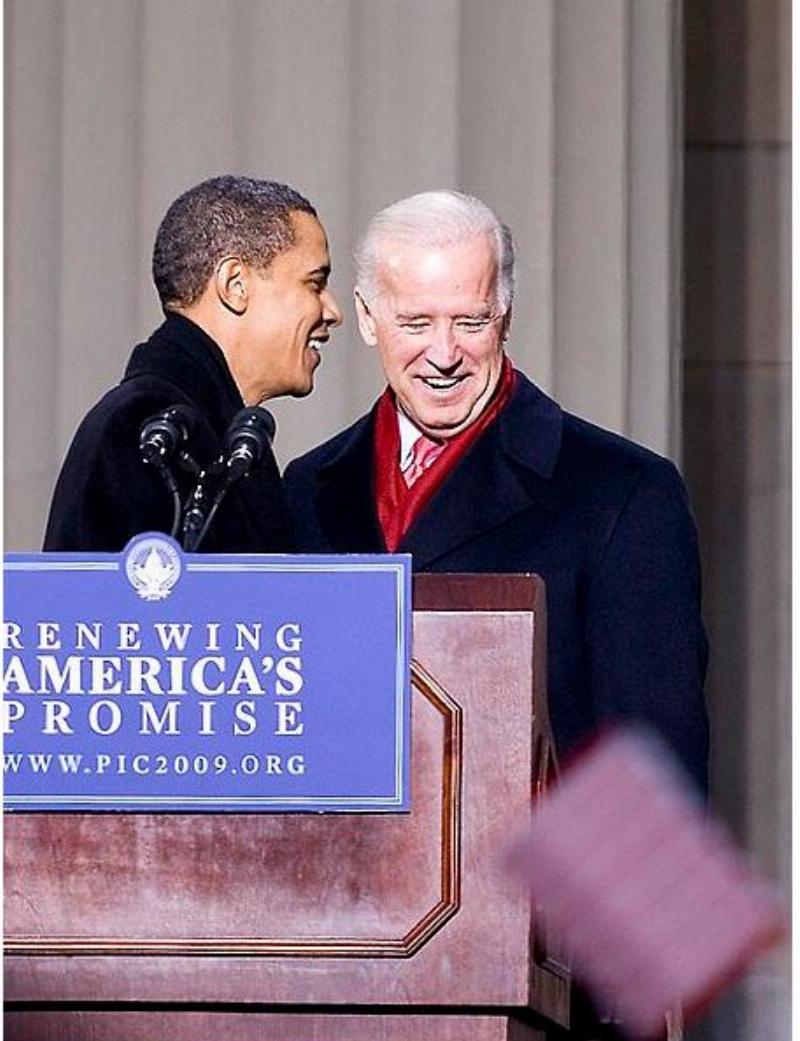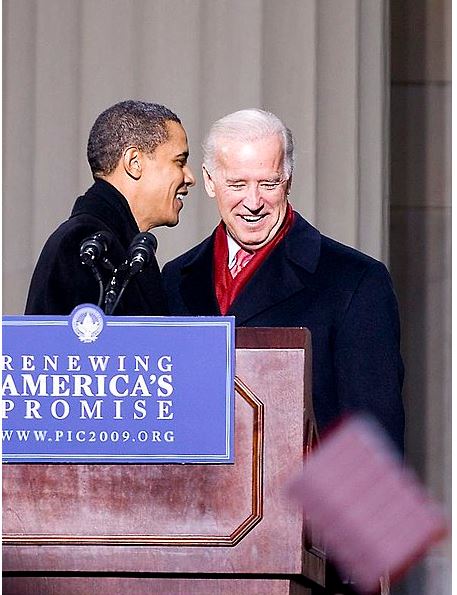

Photo Credit:Obama and Biden
wikimedia cc2
How did Democrats convince so many Jews that Trump is racist and antisemite in 2017? Here is what I found...
How did Democrats convince so many Jews that Trump is racist and antisemitic in 2017?
The Democrats have been calling Republicans racists and worse for decades, so mere propaganda could not have achieved that.
What I found in searching for the answer might also explain how anti-Trump sentiment spread over society, rising to the level of Trump Derangement Syndrome.
Start with the series of JCC threats.
Begining before Trump’s inauguration as 45th POTUS, hundreds of bomb threats were made against Jewish community centers and schools in the U.S.
The threats came in five waves: Jan. 9 (three days after the election’s certification), Jan. 18 (two days before the inauguration), Jan. 31 (following the travel ban, fueling Big Tech-led insurrection), Feb. 20, and Feb. 28.
The media unanimously declared that these threats came from white supremacists in the U.S., allegedly emboldened by the election of President Trump.
The FBI knew that most of the threats were made over the Internet, could have been made from anywhere in the world, and likely came from abroad, but refused to say that officially. In hindsight, this can be linked to the agenda of FBI Director James Comey and his number two, Andrew McCabe. The agenda was to undermine the president whose election they had attempted to prevent and to hide how easy the Obama-Biden administration made it for foreign threat actors to obtain classified info and impact events in the U.S.
On March 23, the information about the perpetrator of most threats was published, refuting accusations against Trump and “white supremacists.” Almost all threats were made by an autistic 18-year-old, Michael Kadar, living in Israel. He was engaged in criminal activity online from his parents’ home. Among other things, he provided a “service” for making threats over the Internet. His claims of “boredom” as the motive are implausible, given that he did such things for money. Almost certainly, these threats were ordered by somebody who hated Trump.
The perpetrator could not know the identities of those who ordered those threats (this is how Internet crime works), but the FBI could have found them in other ways.
A small number of threats in the last two waves were made by a leftist African American journalist, who said he was trying to frame his ex-girlfriend.
When it became clear that the evidence vindicated Trump, the subject disappeared from the media agenda. The public impression that it was Trump’s fault remained.
Then there was the attack on Rabbi Haskel Lookstein.
The internet and social media enabled a novel kind of attack on individuals by penetrating the small community of the target. Rabbi Lookstein was attacked this way in July 2016 when he accepted an invitation to speak at an RNC conference, which was to declare Donald Trump as the Republican candidate officially.
Rabbi Haskel Lookstein, then 84, was a rabbi of the modern orthodox congregation Kehilath Jeshurun and rabbi emeritus of the Ramaz School in New York. He was not political or partisan. He performed a public prayer for President Obama in 2009. That did not help him.
The attack was launched on July 14, 2016, by a petition posted on Change.org, titled Ramaz School: Rabbi Lookstein — You May Speak for Trump, But Not in Our Name. The petition regurgitated the Hillary campaign falsehood and propaganda points (“To embrace Trump and Trumpism goes against all we’ve been taught … his refusal to attend the NAACP convention…”). It was signed by one person, Jacob Savage, who claimed to be a former student of Ramaz school.
The petition invited signatures from people worldwide with any attitude toward Jews and the US but gained only 816 signatures. I found only one signer related to the Ramaz school community, an alumni named Yitz Landes. Yitz acknowledged that his politics are uncommon and even unacceptable in his circle: “At risk of alienating the few Facebook friends of mine who have not yet unfriended me because of my politics, I will say that Donald Trump is a horrible person.” He also published the target’s email: “If you’d like to email R. Lookstein, his email is [email protected].” This is an invitation to harass the target, intentional or not. This attack also had offline components.
Consequently, R. Lookstein withdrew from the conference: “Like my father before me, I have never been involved in politics. Politics divides people.”
Of course, the public misinterpreted this as a repudiation of Trump. Democrat activists behind this attack learned that bullying works and escalated it against other targets. That evolved into the infamous “search and destroy” strategy against Trump’s appointees.
Now, it is clear that many people stayed away from the candidate and, later, President Trump because they did not want to be targeted by a Democrat-triggered mob. Others interpreted this avoidance as a sign of disapproval of Donald Trump or an indication that Trump had unknown defects. This weakened the Trump presidency and encouraged attacks from all sides, including federal government employees.
There also was an attack on Rabbi Marvin Hier.
Rabbi Marvin Hier, the founder of the Simon Wiesenthal Center, was one of the religious leaders invited to pray at Trump’s inauguration on Jan. 20, 2017. He was the first rabbi to speak at a presidential inauguration since 1985. As soon as it became known that the invitation was extended, a vicious campaign was launched against him. On Jan. 3, 2017 (just before the certification session of the Congress), a petition popped up on Change.org, signed by someone named Mya Stark and “Movement for Accountability for the Trump Administration.” Despite the invitation extended to the whole world, it gained only 3,299 signers.
R. Hier refused to yield and rebuked some detractors, saying they acted as if elections were not over.
After that came intimidation by the ruling party.
In May 2016, Hillary Clinton said on national television: “I do not want Americans and, you know, good-thinking Republicans, as well as Democrats and independents, to start to believe that this [Trump] is a normal candidacy.” Hillary Clinton represented the incumbent party. Calling a presumptive candidate from the opposition this way is intimidation. This threat was aggravated by the conduct of the Obama-Biden administration, which had successfully used the IRS to persecute and destroy the Tea Party, jailed dissidents, suppressed opposition media, and created an atmosphere more like a totalitarian state than the U.S.
It was also a signal to the intelligence and national security community. Remember this Page–Strzok communication “she [Hillary Clinton] might be our next president. The last thing you need us going in there loaded for bear…” This was February 2016, long before Obama’s FBI targeted the Trump campaign. After that, Hillary’s chances skyrocketed. In October 2016, some bookmakers paid out gamblers who bet on her victory.
Later calls against “normalizing Trump” were just references to that speech and veiled threats, not always intentional. I think that this intimidation campaign caused the Republican Jewish Coalition not to endorse Trump in 2016. Most RJC directors were businessmen, vulnerable to vindictive “regulation” expected from a Hillary administration. Such intimidation was unprecedented, and yielding to it was likely misinterpreted as a denunciation of Trump.
The role of social media, this kingdom of crooked mirrors, is out of scope.
To conclude:
The Obama-Biden administration and the Democrat campaign have intimidated prominent Jews against supporting and even associating with Donald Trump in 2016-2017. Because such intimidation had no precedent in this country, their silence was perceived as agreement with a vocal minority of Trump haters.
Trump was also wrongly blamed for threats against Jewish community centers, which started under the outgoing Obama-Biden administration, were likely ordered by someone associated with it, and abetted by its holdovers.
P.S.: Microsoft Copilot AI assistant refused to assist with this text because of its content.





